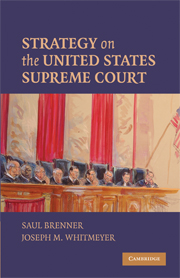Book contents
- Frontmatter
- Contents
- Preface
- PART I INTRODUCTION
- 1 The Legal Model
- 2 The Attitudinal Model
- 3 The Strategic Models
- PART II CERTIORARI
- PART III THE CONFERENCE VOTE ON THE MERITS
- PART IV THE MAJORITY OPINION AND OTHER OPINIONS
- PART V THE FINAL VOTE ON THE MERITS
- PART VI CONCLUDING CHAPTERS
- Appendix 1 Decision Making on the United States Supreme Court
- Appendix 2 Additional Questions to Explore
- References
- Table of Cases
- Index
3 - The Strategic Models
Published online by Cambridge University Press: 05 June 2012
- Frontmatter
- Contents
- Preface
- PART I INTRODUCTION
- 1 The Legal Model
- 2 The Attitudinal Model
- 3 The Strategic Models
- PART II CERTIORARI
- PART III THE CONFERENCE VOTE ON THE MERITS
- PART IV THE MAJORITY OPINION AND OTHER OPINIONS
- PART V THE FINAL VOTE ON THE MERITS
- PART VI CONCLUDING CHAPTERS
- Appendix 1 Decision Making on the United States Supreme Court
- Appendix 2 Additional Questions to Explore
- References
- Table of Cases
- Index
Summary
If the justices are “strategic actors,” as Epstein and Knight (1998, p. 10) maintain, what is their goal? According to Baum (2006, p. 6) a strategic justice will want the Court and the government as a whole to adopt a legal or public policy that is as close as possible to the policy she favors. A strategic justice, for example, might vote to grant certiorari (i.e., vote in favor of the Court hearing and deciding the case), in part, because she expects the Court to adopt her preferred policy when it hands down its decision (see Chapter 5). In addition, a strategic justice might vote insincerely and with the majority at the conference vote on the merits because she believes that such voting might enable her to influence the content of the majority opinion and, thereby, obtain some damage control (see Chapter 6). Finally, a strategic majority opinion writer might be willing to modify her ideal opinion to attract four additional votes for it, so that she can hand down an authoritative Opinion of the Court (also called a majority opinion), instead of a plurality opinion (see Chapter 9).
In contrast, a sincere justice will vote in accord with his preferred legal or policy position without considering the influence of his vote on the legal or policy position that will be adopted by the Court or the government as a whole.
Supreme Court scholars disagree regarding the extent to which the justices on the Court are strategic actors.
- Type
- Chapter
- Information
- Strategy on the United States Supreme Court , pp. 19 - 28Publisher: Cambridge University PressPrint publication year: 2009



